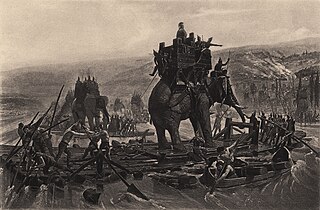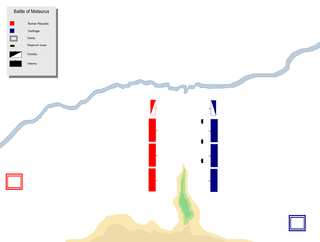Related Research Articles

The 3rd century BC started the first day of 300 BC and ended the last day of 201 BC. It is considered part of the Classical Era, epoch, or historical period.
This article concerns the period 229 BC – 220 BC.
Year 202 BC was a year of the pre-Julian Roman calendar. At the time it was known as the Year of the Consulship of Geminus and Nero. The denomination 202 BC for this year has been used since the early medieval period, when the Anno Domini calendar era became the prevalent method in Europe for naming years.

This article concerns the 200 BC decade, that lasted from 209 BC to 200 BC.
This article concerns the period 219 BC – 210 BC.
This article concerns the period 189 BC – 180 BC.
This article concerns the period 199 BC – 190 BC.
Year 221 BC was a year of the pre-Julian Roman calendar. At the time it was known in Rome as the Year of the Consulship of Asina and Rufus/Lepidus. The denomination 221 BC for this year has been used since the early medieval period, when the Anno Domini calendar era became the prevalent method in Europe for naming years.
Year 206 BC was a year of the pre-Julian Roman calendar. At the time it was known as the Year of the Consulship of Philo and Metellus. The denomination 206 BC for this year has been used since the early medieval period, when the Anno Domini calendar era became the prevalent method in Europe for naming years.
Year 205 BC was a year of the pre-Julian Roman calendar. At the time it was known as the Year of the Consulship of Scipio and Dives. The denomination 205 BC for this year has been used since the early medieval period, when the Anno Domini calendar era became the prevalent method in Europe for naming years.
Year 208 BC was a year of the pre-Julian Roman calendar. At the time it was known as the Year of the Consulship of Marcellus and Crispinus. The denomination 208 BC for this year has been used since the early medieval period, when the Anno Domini calendar era became the prevalent method in Europe for naming years.
Year 209 BC was a year of the pre-Julian Roman calendar. At the time it was known as the Year of the Consulship of Verrucosus and Flaccus. The denomination 209 BC for this year has been used since the early medieval period, when the Anno Domini calendar era became the prevalent method in Europe for naming years.
Year 188 BC was a year of the pre-Julian Roman calendar. At the time it was known as the Year of the Consulship of Messalla and Salinator. The denomination 188 BC for this year has been used since the early medieval period, when the Anno Domini calendar era became the prevalent method in Europe for naming years.

Hasdrubal Barca, a latinization of ʿAzrubaʿal son of Hamilcar Barca, was a Carthaginian general in the Second Punic War. He was the brother of Hannibal and Mago Barca.

The Battle of the Metaurus was a pivotal battle in the Second Punic War between Rome and Carthage, fought in 207 BC near the Metauro River in Italy. The Carthaginians were led by Hasdrubal Barca, brother of Hannibal, who was to have brought siege equipment and reinforcements for Hannibal. The Roman armies were led by the consuls Marcus Livius, who was later nicknamed the Salinator, and Gaius Claudius Nero.

Philopoemen was a skilled Greek general and statesman, who was Achaean strategos on eight occasions.

Gaius Claudius Nero was a Roman general active during the Second Punic War against the invading Carthaginian force, led by Hannibal Barca. During a military career that began as legate in 214 BC, he was praetor in 212 BC, propraetor in 211 BC during the siege of Capua, before being sent to Spain that same year. He became consul in 207 BC.
Marcus Livius Salinator was a Roman general and politician who fought in the Second Punic War, most notably during the Battle of the Metaurus.
Machanidas was a tyrant of Lacedaemon near the end of the 3rd century BC. He was defeated and slain by Philopoemen.
References
- ↑ Hung, Hing Ming (2011). The Road to the Throne: How Liu Bang Founded China's Han Dynasty. pp. 54–73. ISBN 978-0875868387.